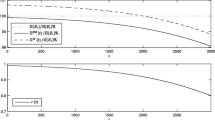Abstract
A study of the dynamics of the collective behavior of interconnected rational agents under conditions of incomplete information is presented. Statements are proved that permit one to unify the conditions for convergence to equilibrium for two trajectories of the response of agents to the expected actions of the environment: (1) “classic” optimization behavior, in which agents try to choose optimal responses, ignoring possible current “negative states;” (2) behavior that guarantees each agent motion towards the objective and nonnegative current states. The application of the results obtained in the Cournot and Stackelberg oligopoly models with reflexive behavior of agents is shown. Sufficient conditions for the convergence of processes of collective behavior in an oligopoly with an arbitrary number of Stackelberg leaders are obtained.
Similar content being viewed by others
REFERENCES
Novikov, D.A. and Chkhartishvili, A.G., Reflexion and Control: Mathematical Models, Leiden: CRC Press, 2014.
Novikov, D., Korepanov, V., and Chkhartishvili, A., Reflexion in mathematical models of decision-making, Int. J. Parallel Emerg. Distrib. Syst., 2018, vol. 33, no. 3, pp. 319–335.
Cournot, A., Researches into the Mathematical Principles of the Theory of Wealth, London: Hafner, 1960 (Original 1838).
Stackelberg, H., Market Structure and Equilibrium: 1st Ed. Translation into English, Basin–Urch&Hill: Springer, 2011 (Original 1934).
The Handbook of Experimental Economics, Kagel, J. and Roth, A., Eds., Princeton: Princeton Univ. Press, 1995.
Wright, J. and Leyton-Brown, K., Beyond equilibrium: predicting human behavior in normal form games, in Proc. Conf. Assoc. Adv. Artif. Intell. (AAAI-10), 2010, pp. 461–473.
Aizenberg, N.I., Zorkal’tsev, V.I., and Mokryi, I.V., Study of unsteady oligopoly markets, J. Appl. Ind. Math., 2017, vol. 11, no. 1, pp. 8–16.
Geras’kin, M.I. and Chkhartishvili, A.G., Analysis of game-theoretic models of an oligopoly market under constrains on the capacity and competitiveness of agents, Autom. Remote Control, 2017, vol. 78, no. 11, pp. 2025–2038.
Opoitsev, V.I., Ravnovesie i ustoichivost’ v modelyakh kollektivnogo povedeniya (Equilibrium and Stability in Models of Collective Behavior), Moscow: Nauka, 1977.
Malishevskii, A.V., Kachestvennye modeli v teorii slozhnykh sistem (Qualitative Models in the Theory of Complex Systems), Moscow: Nauka, 1998.
Kalashnikov, V.V., Bulavsky, V.A., and Kalashnykova, N.I., Existence of the Nash-optimal strategies in the meta-game, Studies Syst., Decision Control, 2018, vol. 100, pp. 95–100.
Algazin, G.I. and Algazina, D.G., Collective behavior in the Stackelberg model under incomplete information, Autom. Remote Control, 2017, vol. 78, no. 9, pp. 1619–1630.
Dusouchet, O.M., Static Cournot–Nash equilibria and strategic reflective games of oligopoly: a case of linear functions of demand and costs, Ekon. Zh. Vyssh. Shkola Ekon., 2006, no. 1, pp. 3–32.
Algazin, G.I. and Algazina, Yu.G., Reflexive dynamics in the Cournot oligopoly under uncertainty, Autom. Remote Control, 2020, vol. 81, no. 2, pp. 345–359.
Algazin, G.I. and Algazina, D.G., Reflexive processes and equilibrium in an oligopoly model with a leader, Autom. Remote Control, 2020, vol. 81, no. 7, pp. 1258–1270.
Samarskii, A.A. and Gulin, A.V., Chislennye metody (Numerical Methods), Moscow: Nauka, 1989.
Belitskii, G.R. and Lyubich, Yu.I., Normy matrits i ikh prilozheniya (Norms of Matrices and Applications), Kiev: Nauk. Dumka, 1984.
Ueda, M., Effect of information asymmetry in Cournot duopoly game with bounded rationality, Appl. Math. Comput., 2019, vol. 362, p. 124535.
Elsadany, A.A., Dynamics of a Cournot duopoly game with bounded rationality based on relative profit maximization, Appl. Math. Comput., 2017, vol. 294, pp. 253–263.
Askar, S. and Simos, T., Tripoly Stackelberg game model: one leader versus two followers, Appl. Math. Comput., 2018, vol. 328, pp. 301–311.
Wu, R. and Van Gorder, R.A., Nonlinear dynamics of discrete time multi-level leader–follower games, Appl. Math. Comput., 2018, vol. 320, pp. 240–250.
Author information
Authors and Affiliations
Corresponding authors
Additional information
Translated by V. Potapchouck
Rights and permissions
About this article
Cite this article
Algazin, G.I., Algazina, Y.G. To the Analytical Investigation of the Convergence Conditions of the Processes of Reflexive Collective Behavior in Oligopoly Models. Autom Remote Control 83, 367–388 (2022). https://doi.org/10.1134/S0005117922030067
Received:
Revised:
Accepted:
Published:
Issue Date:
DOI: https://doi.org/10.1134/S0005117922030067



